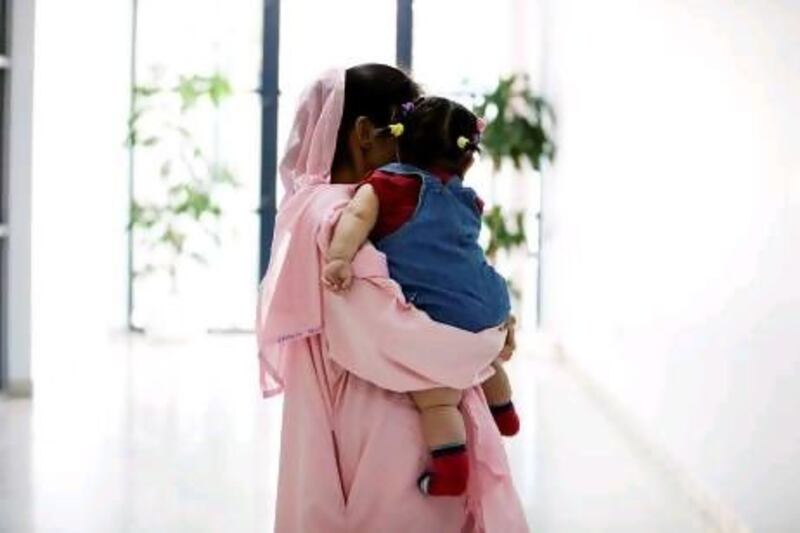DUBAI // In terms of the awkward conversations parents can be forced into having with their children, it must rank as one of the hardest. The day when the parent must admit that things are not exactly as the child was led to believe.
The day the child's curiosity gets too much and their mother has to tell them they are not living in a hotel, or on a long holiday. The day they tell them they are living in a jail - and always have been.
It is a conversation that DM, a Nigerian mother at the Dubai Female Prison in Al Aweer, can remember all too well. In June 2008, when she was eight months pregnant, she was sentenced to six months in prison for an unspecified financial crime. She is still there and has little hope of leaving, as she will not be released until she settles debts of Dh994,000.
Meanwhile, her daughter, who was born at the beginning of her sentence, has since turned into a precocious toddler who is quick to spot when mum isn't telling the truth.
"I still remember the exact date of when my daughter asked me where we are, she was two years and nine months," says DM, struggling to fight back her tears. "I told her that we were in a five-star hotel. She just looked at me and told me 'mama why are you telling lies?'"
Her daughter is one of 43 children, all below the age of five, who call the prison home. Many have lived at the jail since birth.
According to the law, female prisoners are allowed custody of their children up to the age of two. However, Dubai Police make exceptions for some of the children, for various reasons. Some have no other family member to stay with. There is a separate wing for the mothers, who stay in cells of four beds, rather than the standard six.
KN, a 34-year-old Filipina, was pregnant when she was sent to the prison in November 2010 to serve a three-month sentence, also for an unspecified financial crime. She was taken to Latifa Hospital in May 2011 to give birth and returned to the prison shortly after with a daughter she describes as her only source of strength.
She too has outstayed her original sentence, but is unable to settle her debts of Dh77,000 - money she has little hope of finding.
The Filipina is torn between wanting to be near her daughter but not wanting to see her grow up behind bars. "As a mother I do not want her here but without her I would have gone crazy," she says. Having the little girl around makes it easier to be away from her other two children, who are in the Philippines.
"I do not want my baby to pay the price. I wish to get out soon so she can grow up outside prison," says the Filipina, wiping her tears so they do not fall on to her daughter who is sitting on her lap.
"It is not easy to have grown up in this environment. I am scared of the day when I need to tell her where we are … it is not easy to grasp the idea of being born in prison," she says.
But it is a conversation all the parents must have, sooner or later. While some of the children will believe the stories they are told, many will be more sceptical.
The mothers have plenty of tales about their children that demonstrate just how different their lives are to a normal upbringing. DM recalls that a boy was terrified when he saw a lorry for the first time, and the children often look puzzled when they see a man, as they come across so few at the prison.
One of the most popular games for the children to play is prisoners and prison guard.
In an effort to bring some normality to the children's lives, the prison administration has in the past year introduced the "happy room", a small nursery where children can play.
Major Soad Saeed, the head of the prison, says: "Providing these children with an appropriate environment is one of our biggest challenges." In an effort to meet this challenge the prison is building a new section for the children on a 200-square-metre plot. The building will include a play area, a teaching room and a small medical centre. But despite the effortsthe situation is far from perfect.
Second Lt Fatma Shair Al Mazmi, head of the follow-up unit at the prison, suggests the prisoners and their children would benefit more from a specialised rehabilitation centre, rather than a traditional jail.
"I understand the benefit of having the children with their mothers at such an early age but it simply cannot be good for them," she says.






